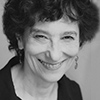-
Spring Feature 2014
-
Feature
- Kurt Brown A Photo Tribute
- Kurt Brown Excerpts from his "Notebook"
-
Poetry
- Laure-Anne Bosselaar
- Lee Briccetti
- Wyn Cooper
- Stephen Dunn
- Richard Garcia
- Janlori Goldman
- Andrey Gritsman
- Kamiko Hahn
- Steve Huff
- Meg Kearney
- Eugenia Leigh
- Thomas Lux
- Laura McCullough
- Christopher Merrill
- Kamilah Aisha Moon
- Martha Rhodes
- David Rothman
- Harold Schechter
- Charles Simic
- Tree Swenson
- Charles Harper Webb
- Marty Williams
-
Essay
- David RigsbeeOn Kurt Brown, An Appreciation
Feature > Poetry
I celebrate Kurt Brown’s joie di vivre, his music and his commitment to the miracle of everyday life, to no other paradise.
I am struck again poem-by-poem by how big-hearted Kurt Brown’s oeuvre is—full of appetites, energy and goodwill— structurally balanced with a disciplined melodic line.
It is not possible to speak of all the mitzvahs Kurt Brown aligned—his generosity to other writers, his many friendships and his nurture to organizations. As I re-read his work I understand in a new way how productive he was. Kurt had fun…and he worked!
One of the poems I love most, and the one I turned to after the news of his death, is “In Paradise.” Its virtuosity is made even more profound for me by the oracular voice of the poet addressing living creation in which he has been present. The voice of the poet is alive and the voice remains.
“There was death in Paradise.” Death was in each leaf even before the “snake’s long, voluptuous/Address…”
This poem is the hinge in a book-length catalogue of begettings and beatitudes, in which the presence of God cannot be disentangled from the presence of death.
So much of our literature and popular culture yearns for a return to Paradise, alternatively expressed as prolonged childhood or an impulse toward the pure. “In Paradise” refuses this nostalgia. The poem embraces the wrecked and the wretched, and the voice of the poet is braced by what I can only call a moral sense of equilibrium.
That equilibrium is artistically enacted through craft—alliterative gesture, repetitive rhetorical devices and a few well-placed refrains:
Of three birds, banished from the nest,
One lay quiet in the grass,
And the grass glistened, green as fire,
And the worm wove through the earth,
And the earth held its silence
While everything else was being born.
Birds banished. Grass glistened green. Worms wove. The stressed alliterations all lead to the jackpot, the turn in the poem that appears again as a final refrain: “everything else was busy being born.”
This delicately calibrated cosmology of attention is also faith in natural processes. Kurt’s interest in science—he edited anthologies that align scientific and poetic language—makes itself felt. Darkness is always present in the physical and philosophical dark energy we are made of.
“In Paradise” is an Ars Poetica that operates as a kind of hymn. The singing voice is my friend’s personal message about our lives evolved through nature and the incipient presence of death. And it recounts our lives as writers, how we live together by observing, making and letting go.
In Paradise
Before Adam, before Eve or the snake's long, voluptuous
Address, death entered the leaf
Like a drug, stole into the veins of light,
Inhabited the small corridors of rain.
God put it there. It was His presence,
The lingering odor of His breath.
Of three birds, banished from the nest,
One lay quiet in the grass,
And the grass glistened, green as fire,
And the worm wove through the earth,
And the earth held its silence
While everything else was being born.
Death was God's other face,
His secret name, the way the angels
Called to Him through the golden aisles
Of the Garden.
It was the light
Inside the light, which was a darkness
Scattered in the air, like pollen, like dust.
The creatures were made of it,
It was what they were.
Of three birds, banished from the nest,
One lay quiet in the grass
While everything else was being born.



